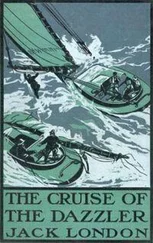Jack London - The Cruise of the Snark
Здесь есть возможность читать онлайн «Jack London - The Cruise of the Snark» весь текст электронной книги совершенно бесплатно (целиком полную версию без сокращений). В некоторых случаях можно слушать аудио, скачать через торрент в формате fb2 и присутствует краткое содержание. Жанр: Классическая проза, Морские приключения, на английском языке. Описание произведения, (предисловие) а так же отзывы посетителей доступны на портале библиотеки ЛибКат.
- Название:The Cruise of the Snark
- Автор:
- Жанр:
- Год:неизвестен
- ISBN:нет данных
- Рейтинг книги:3 / 5. Голосов: 1
-
Избранное:Добавить в избранное
- Отзывы:
-
Ваша оценка:
- 60
- 1
- 2
- 3
- 4
- 5
The Cruise of the Snark: краткое содержание, описание и аннотация
Предлагаем к чтению аннотацию, описание, краткое содержание или предисловие (зависит от того, что написал сам автор книги «The Cruise of the Snark»). Если вы не нашли необходимую информацию о книге — напишите в комментариях, мы постараемся отыскать её.
The Cruise of the Snark — читать онлайн бесплатно полную книгу (весь текст) целиком
Ниже представлен текст книги, разбитый по страницам. Система сохранения места последней прочитанной страницы, позволяет с удобством читать онлайн бесплатно книгу «The Cruise of the Snark», без необходимости каждый раз заново искать на чём Вы остановились. Поставьте закладку, и сможете в любой момент перейти на страницу, на которой закончили чтение.
Интервал:
Закладка:
And such a ride! Falling water was everywhere. We rode above the clouds, under the clouds, and through the clouds! and every now and then a shaft of sunshine penetrated like a search-light to the depths yawning beneath us, or flashed upon some pinnacle of the crater-rim thousands of feet above. At every turn of the trail a waterfall or a dozen waterfalls, leaping hundreds of feet through the air, burst upon our vision. At our first night's camp, in the Keanae Gulch, we counted thirty-two waterfalls from a single viewpoint. The vegetation ran riot over that wild land. There were forests of koa and kolea trees, and candlenut trees; and then there were the trees called ohia-ai, which bore red mountain apples, mellow and juicy and most excellent to eat. Wild bananas grew everywhere, clinging to the sides of the gorges, and, overborne by their great bunches of ripe fruit, falling across the trail and blocking the way. And over the forest surged a sea of green life, the climbers of a thousand varieties, some that floated airily, in lacelike filaments, from the tallest branches others that coiled and wound about the trees like huge serpents; and one, the ei-ei, that was for all the world like a climbing palm, swinging on a thick stem from branch to branch and tree to tree and throttling the supports whereby it climbed. Through the sea of green, lofty tree-ferns thrust their great delicate fronds, and the lehua flaunted its scarlet blossoms. Underneath the climbers, in no less profusion, grew the warm-coloured, strangely-marked plants that in the United States one is accustomed to seeing preciously conserved in hot- houses. In fact, the ditch country of Maui is nothing more nor less than a huge conservatory. Every familiar variety of fern flourishes, and more varieties that are unfamiliar, from the tiniest maidenhair to the gross and voracious staghorn, the latter the terror of the woodsmen, interlacing with itself in tangled masses five or six feet deep and covering acres.
Never was there such a ride. For two days it lasted, when we emerged into rolling country, and, along an actual wagon-road, came home to the ranch at a gallop. I know it was cruel to gallop the horses after such a long, hard journey; but we blistered our hands in vain effort to hold them in. That's the sort of horses they grow on Haleakala. At the ranch there was great festival of cattle- driving, branding, and horse-breaking. Overhead Ukiukiu and Naulu battled valiantly, and far above, in the sunshine, towered the mighty summit of Haleakala.
CHAPTER IX—A PACIFIC TRAVERSE
Sandwich Islands to Tahiti.—There is great difficulty in making this passage across the trades. The whalers and all others speak with great doubt of fetching Tahiti from the Sandwich islands. Capt. Bruce says that a vessel should keep to the northward until she gets a start of wind before bearing for her destination. In his passage between them in November, 1837, he had no variables near the line in coming south, and never could make easting on either tack, though he endeavoured by every means to do so.
So say the sailing directions for the South Pacific Ocean; and that is all they say. There is not a word more to help the weary voyager in making this long traverse—nor is there any word at all concerning the passage from Hawaii to the Marquesas, which lie some eight hundred miles to the northeast of Tahiti and which are the more difficult to reach by just that much. The reason for the lack of directions is, I imagine, that no voyager is supposed to make himself weary by attempting so impossible a traverse. But the impossible did not deter the Snark,—principally because of the fact that we did not read that particular little paragraph in the sailing directions until after we had started. We sailed from Hilo, Hawaii, on October 7, and arrived at Nuka-hiva, in the Marquesas, on December 6. The distance was two thousand miles as the crow flies, while we actually travelled at least four thousand miles to accomplish it, thus proving for once and for ever that the shortest distance between two points is not always a straight line. Had we headed directly for the Marquesas, we might have travelled five or six thousand miles.
Upon one thing we were resolved: we would not cross the Line west of 130 degrees west longitude. For here was the problem. To cross the Line to the west of that point, if the southeast trades were well around to the southeast, would throw us so far to leeward of the Marquesas that a head-beat would be maddeningly impossible. Also, we had to remember the equatorial current, which moves west at a rate of anywhere from twelve to seventy-five miles a day. A pretty pickle, indeed, to be to leeward of our destination with such a current in our teeth. No; not a minute, nor a second, west of 130 degrees west longitude would we cross the Line. But since the southeast trades were to be expected five or six degrees north of the Line (which, if they were well around to the southeast or south- southeast, would necessitate our sliding off toward south- southwest), we should have to hold to the eastward, north of the Line, and north of the southeast trades, until we gained at least 128 degrees west longitude.
I have forgotten to mention that the seventy-horse-power gasolene engine, as usual, was not working, and that we could depend upon wind alone. Neither was the launch engine working. And while I am about it, I may as well confess that the five-horse-power, which ran the lights, fans, and pumps, was also on the sick-list. A striking title for a book haunts me, waking and sleeping. I should like to write that book some day and to call it "Around the World with Three Gasolene Engines and a Wife." But I am afraid I shall not write it, for fear of hurting the feelings of some of the young gentlemen of San Francisco, Honolulu, and Hilo, who learned their trades at the expense of the Snark's engines.
It looked easy on paper. Here was Hilo and there was our objective, 128 degrees west longitude. With the northeast trade blowing we could travel a straight line between the two points, and even slack our sheets off a goodly bit. But one of the chief troubles with the trades is that one never knows just where he will pick them up and just in what direction they will be blowing. We picked up the northeast trade right outside of Hilo harbour, but the miserable breeze was away around into the east. Then there was the north equatorial current setting westward like a mighty river. Furthermore, a small boat, by the wind and bucking into a big headsea, does not work to advantage. She jogs up and down and gets nowhere. Her sails are full and straining, every little while she presses her lee-rail under, she flounders, and bumps, and splashes, and that is all. Whenever she begins to gather way, she runs ker- chug into a big mountain of water and is brought to a standstill. So, with the Snark, the resultant of her smallness, of the trade around into the east, and of the strong equatorial current, was a long sag south. Oh, she did not go quite south. But the easting she made was distressing. On October 11, she made forty miles easting; October 12, fifteen miles; October 13, no easting; October 14, thirty miles; October 15, twenty-three miles; October 16, eleven miles; and on October 17, she actually went to the westward four miles. Thus, in a week she made one hundred and fifteen miles easting, which was equivalent to sixteen miles a day. But, between the longitude of Hilo and 128 degrees west longitude is a difference of twenty-seven degrees, or, roughly, sixteen hundred miles. At sixteen miles a day, one hundred days would be required to accomplish this distance. And even then, our objective, l28 degrees west longitude, was five degrees north of the Line, while Nuka-hiva, in the Marquesas, lay nine degrees south of the Line and twelve degrees to the west!
There remained only one thing to do—to work south out of the trade and into the variables. It is true that Captain Bruce found no variables on his traverse, and that he "never could make easting on either tack." It was the variables or nothing with us, and we prayed for better luck than he had had. The variables constitute the belt of ocean lying between the trades and the doldrums, and are conjectured to be the draughts of heated air which rise in the doldrums, flow high in the air counter to the trades, and gradually sink down till they fan the surface of the ocean where they are found. And they are found where they are found; for they are wedged between the trades and the doldrums, which same shift their territory from day to day and month to month.
Читать дальшеИнтервал:
Закладка:
Похожие книги на «The Cruise of the Snark»
Представляем Вашему вниманию похожие книги на «The Cruise of the Snark» списком для выбора. Мы отобрали схожую по названию и смыслу литературу в надежде предоставить читателям больше вариантов отыскать новые, интересные, ещё непрочитанные произведения.
Обсуждение, отзывы о книге «The Cruise of the Snark» и просто собственные мнения читателей. Оставьте ваши комментарии, напишите, что Вы думаете о произведении, его смысле или главных героях. Укажите что конкретно понравилось, а что нет, и почему Вы так считаете.







